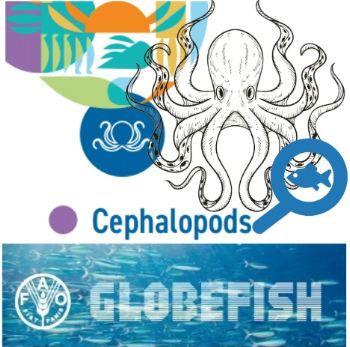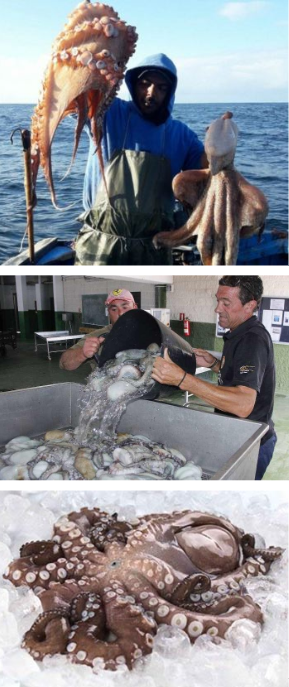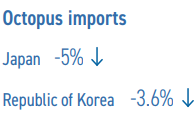|

Photo: FAO/FIS
Globefish report on the global octopus market
 WORLDWIDE WORLDWIDE
Wednesday, July 17, 2024, 07:00 (GMT + 9)
The following is an excerpt from a report published by Globefish (FAO):
Octopus supplies remain low
 Octopus supplies are still low and likely to remain so through 2024, while supplies of squid are somewhat better. Octopus prices will stay high and possibly even rise further during the summer holidays. There is great pressure on the squid resources off South America, where hundreds of foreign vessels are fishing in international waters just outside the national EEZs. Octopus supplies are still low and likely to remain so through 2024, while supplies of squid are somewhat better. Octopus prices will stay high and possibly even rise further during the summer holidays. There is great pressure on the squid resources off South America, where hundreds of foreign vessels are fishing in international waters just outside the national EEZs.
Octopus landings have slowed down, particularly in southern Morocco, which was hit by adverse weather conditions. Also, most catches consisted of smaller size octopuses, especially T7 (500–800 g). After the first two weeks of the month (January 2024), landings diminished, and there was a general shortage of supplies.
In February 2024, Moroccan authorities announced that they had increased the octopus quota to 25 200 tonnes for the year. This is 4 200 tonnes more than the original quota. The main reason for this increase was said to be the government’s commitment to support the industry, as some vessels had already filled their quota for octopus and were not able to fish for other species.
Then suddenly, at the very end of March, the Moroccan Ministry of Agriculture and Fisheries announced that all octopus fishing in Moroccan waters was to stop, effective 1 April. The reason given was to ensure sustainable fishing practices in the region, but the duration of this pause was not announced and fishermen are still left in the dark. However, they are allowed to fish for other cephalopods during this period, as long as they obtain a special authorization and refrain from targeting octopus.
Demand for larger sizes is strong in Spain, and demand in Italy is also good, with Italian cold storage holdings low. Consequently, prices have risen, and most observers expect them to stay high for some time. In Morocco, octopus prices started at a low level in January 2024 but jumped suddenly, mid-month.
Trade
 Japanese imports of octopus fell by five percent in 2023 compared to 2022 and ended up at 40 340 tonnes. The largest suppliers were Mauritania (12 136 tonnes; +23 percent), China (9 671 tonnes; 8 percent) and Viet Nam (7 957 tonnes; -12 percent). Morocco, which was a big supplier in 2022, reduced shipments to Japan by 32 percent to just 5 814 tonnes. Japanese imports of octopus fell by five percent in 2023 compared to 2022 and ended up at 40 340 tonnes. The largest suppliers were Mauritania (12 136 tonnes; +23 percent), China (9 671 tonnes; 8 percent) and Viet Nam (7 957 tonnes; -12 percent). Morocco, which was a big supplier in 2022, reduced shipments to Japan by 32 percent to just 5 814 tonnes.
The Republic of Korea also registered a drop in imports, from 72 295 tonnes in 2022 to 69 674 tonnes in 2023 (-3.6 percent). China strengthened its position as the largest supplier to the Republic of Korea, shipping 32 430 tonnes (+6.2 percent) and accounting for 46.5 percent of the total. Viet Nam registered a five percent fall in shipments to the Republic of Korea, while products from the third largest supplier, Thailand, dropped by 28.7 percent to just 4 529 tonnes.
Source: FAO-Globefish
editorial@seafood.media
www.seafood.media
|



